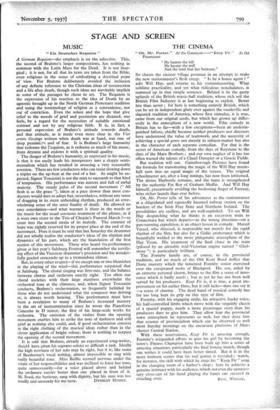THE CINEMA
" Oh, Mr. Porter." At the Gaumont—" Keep Fit." At the Paramount " He haunts the hill He haunts the mill And the land that lies between."
So chants the sinister village postman in an attempt to make the new stationmaster's flesh creep. " Is he a house agent ? " asks Will Hay, and returns to his stationmas tering. What sublime practicality, and yet what ridiculous nonchalance, is summed up in that simple sentence. Behind it lie the gusty uplands of the British music-hall tradition, whose rich soil the British Film Industry is at last beginning to exploit. Better late than never ; for here is something entirely British, which can be set in independent glory over against the vaudeville and slapstick tradition of America, whose first stimulus, it is true, came from our original seeds, but which has grown up differ- ently in the atmosphere of a new world. Film comedy in Britain has so far—with a few exceptions—been an undistin- guished failure, chiefly because neither producers nor directors have understood the value of teamwork, and the necessity of achieving a special genre not merely in subject-matter but also in the character of each separate comedian. For that is the secret of American comedy, from the days of Keystone to the days of the Marx Brothers ; and our own neglect of it has too often wasted the talents of a Claud Dampier or a Gracie Fields.
But tradition will out. Gainsborough Pictures have found the formula for transmuting the magic of the Will Hay music- hall turn into an equal magic of the screen. The original schoolmaster act, after a long innings, has now been jettisoned.
The divine Harbottle remains, and the team is strengthened by the authentic Fat Boy of Graham Moffat. And Will Hay himself, precariously avoiding the beckoning finger of Fantasy, wins richer laurels than ever before.
Oh, Mr. Porter tells of his adventures as the stationmaster at a dilapidated and reputedly haunted railway station on the borders of the Irish Free State and Northern Ireland. The possibilities are endless, and are well-exploited. To see Will Hay despatching what he thinks is an excursion train to Connemara but which departs—in the wrong direction—on a gun-running expedition, is an object lesson in coMedy. Marcel Varnel, who directed, is responsible not merely for the rapid rhythm of the film, but also for a Gallic exuberance which is beautifully welded to the more phlegmatic atmosphere of the Hay Team. His treatment of the final chase in the train (piloted by an adorable mid-Victorian engine named " Glad- stone ") is particularly brilliant.
The Formby family are, of course, in the provincial tradition, and no touch of the Old Kent Road defiles that Doric mastery which the lamented Formby senior exercised over the enraptured mobs of Blackpool. His son, aided by an extreme personal charm, brings to the film a sense of inno- cence which it badly needs ; but as yet he has not been well served by his producers. Keep Fit is, it is true, a great im- provement on his earlier films, but it still lacks—dare one say it —a sense of cinema. The dead hand of musical comedy has for too long kept its grip on this type of film.
Formby, with his engaging smile, his attractive husky voice, his half-controlled limbs which move with the ungainly charm of a spaniel puppy, needs a more picaresque story than his producers dare to give him. They allow him the provincial town atmosphere he represents so well, but they deny him that essence of provincialism which can be observed so well most Sunday mornings on the excursion platforms of Man- chester Central Station.
With these reservations, Keep Fit is amusing enough. Formby's misguided efforts to gain his girl by becoming the town's Fitness Champion have been built up into a series of amusing situations, particularly the final boxing match, though
one wishes it could have been better timed. But it is in the more intimate scenes that his real genius is revealed ; watch, for instance, the skill with which he sings his " Keep Fit " song in the changing room of a barber's shop ; here he achieves a genuine intimacy with his audience, which not even the unneces- sary close-ups of his hand playing the banjo can succeed in














































 Previous page
Previous page